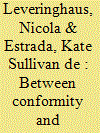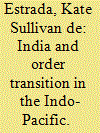|
|
|
Sort Order |
|
|
|
Items / Page
|
|
|
|
|
|
|
| Srl | Item |
| 1 |
ID:
160121


|
|
|
|
|
| Summary/Abstract |
China and India, as rising powers, have been proactive in seeking status as nuclear responsibles. Since the 1990s they have sought to demonstrate conformity with intersubjectively accepted understandings of nuclear responsibility within the global nuclear order, and have also sought recognition on the basis of particularistic practices of nuclear restraint. This article addresses two puzzles. First, nuclear restraint is at the centre of the pursuit of global nuclear order, so why have China and India not received recognition from influential members of the nuclear order for the full spectrum of their restraint-based behaviours? Second, why do China and India nonetheless persist with these behaviours? We argue that the conferral of status as a nuclear responsible is a politicised process shaped by the interests, values, and perceptions of powerful stakeholder states in the global nuclear order. China’s and India’s innovations are not incorporated into the currently accepted set of responsible nuclear behaviours because, indirectly, they pose a strategic, political, and social challenge to these states. However, China’s and India’s innovations are significant as an insight into their identity-projection and preferred social roles as distinctive rising powers, and as a means of introducing new, if nascent, ideas into non-proliferation practice and governance.
|
|
|
|
|
|
|
|
|
|
|
|
|
|
|
|
| 2 |
ID:
190668


|
|
|
|
|
| Summary/Abstract |
Managing order transition in the Indo-Pacific is as much about negotiating the character of regional order as it is about mounting balance of power challenges or establishing countervailing institutional arrangements. For this reason, members of the Quad have expressed ambitions to deliver shared security on the basis of collective identity and values—though at times more in discourse than in practice. This article argues that India is actively contesting and, in some ways reconfiguring, the legitimating narratives of the Quad as an Indo-Pacific ‘security community’. Under the leadership of Narendra Modi, India has approached the socialising imperative of liberal identity cues selectively and ambivalently. More widely, India has declined to pursue an overt, collective strategy of Chinese containment and has propounded distinctive visions of regional security provision. India’s vision for liberal order in the Indo-Pacific stands apart from the ‘security community’ that the other Quad partners have enunciated in their foreign policy discourse, with consequences for the future of order transition in the Indo-Pacific.
|
|
|
|
|
|
|
|
|
|
|
|
|
|
|
|
| 3 |
ID:
153830


|
|
|
|
|
| Summary/Abstract |
The 70th anniversary year of India's independence after two centuries of British colonial rule provides an excellent occasion to take the measure of a country that, today, is pivotal for both Asian and international stability. At 70, despite the persistent domestic challenges of poverty and inequality,1 India is widely considered a rising power,2 and is indisputably the world's largest democracy. In 2015, the Indian economy grew at a rate of 7.5 per cent, faster than that of China.3 As a nuclear-armed state, India enjoys recognition as a responsible nuclear power by key stakeholders in the non-proliferation regime, despite not being a signatory to the Nuclear Non-Proliferation Treaty.
|
|
|
|
|
|
|
|
|
|
|
|
|
|
|
|
| 4 |
ID:
153832


|
|
|
|
|
| Summary/Abstract |
In the post-Cold War era, a number of scholars have observed and encouraged greater ‘pragmatism’ in India's foreign policy. A ‘pragmatic’ foreign policy has been understood as one that rejects India's earlier reliance on Nehruvian ‘idealism’ or ‘moral posturing’, and instead pursues power and material interests. In the wake of his election to power, Prime Minister Narendra Modi, too, has been celebrated by scholars and the media as a pragmatic leader who will be able to dispense with earlier ideas and ideologies and bring about radical changes to Indian foreign policy. In this article, we problematize these ‘substantive’ readings of pragmatism. Instead we present an alternative, ‘procedural’ reading of foreign policy pragmatism that emphasises the selection and fusion—rather than the abandonment—of different ideas and ideological commitments in order to effect foreign policy change. By demonstrating procedural pragmatism at work in two case-studies under Modi's leadership—the resolution of India's territorial dispute with Bangladesh, and the establishment and public celebration of a UN-recognized International Day of Yoga—we show how Modi's pragmatic approach to foreign policy-making is responsive to both Hindutva (Hindu nationalist ideology) and entrenched foreign policy ideas in India. Our central argument is that Modi is neither unique nor uniquely pragmatic, and like many Indian leaders before him, his pragmatism cannot simply abandon ideas and ideology, but is compelled to respond to them in response to domestic and international political logics.
|
|
|
|
|
|
|
|
|
|
|
|
|
|
|
|
|
|
|
|
|